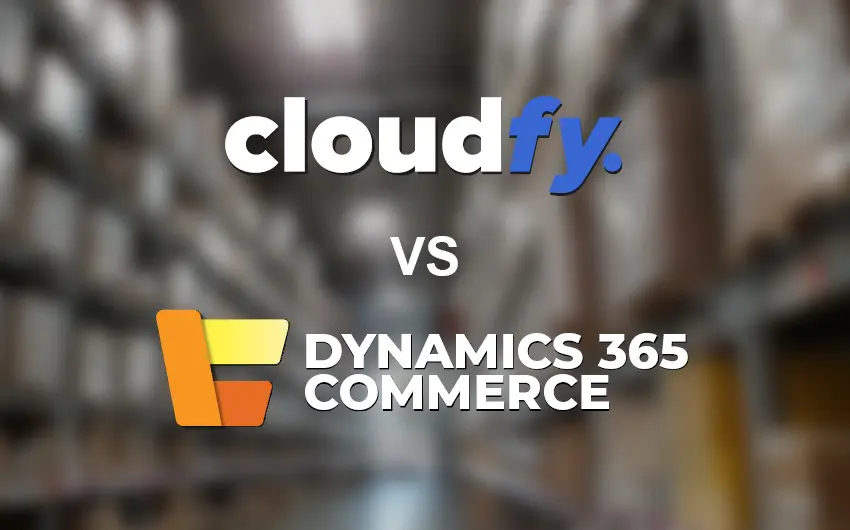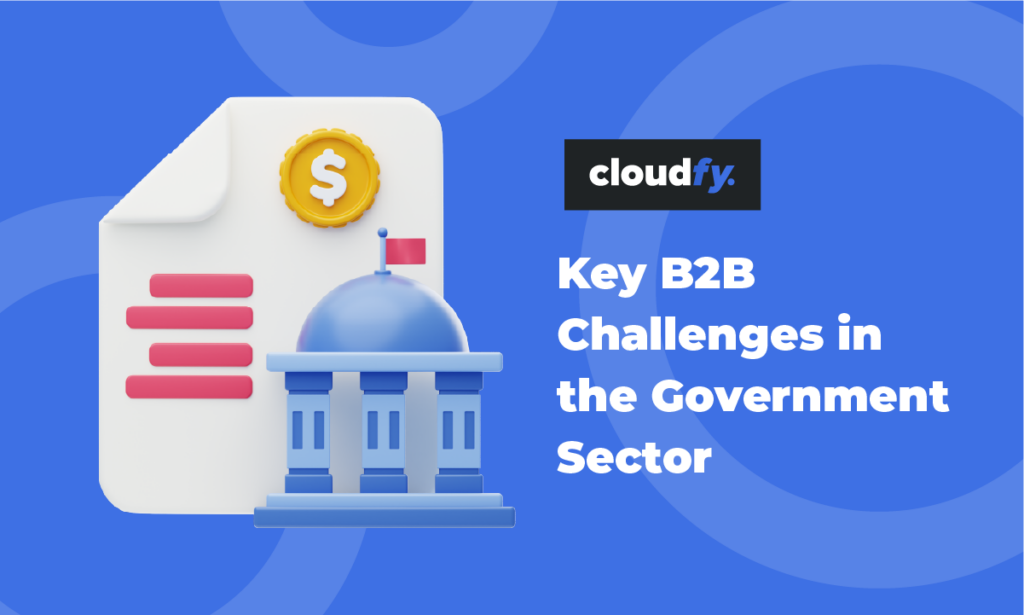Whether you’re planning your first B2B shopping cart or you’re ready to replatform your ecommerce software, one of the solutions you may be considering is Microsoft Dynamics 365 Commerce. Familiar Microsoft interfaces and the reassurance of a trusted brand might make it seem like a safe option that can scale with your business.
You’re likely seeking more than just online ordering capability. Instead, that plus features like customer personalization, intelligent marketing tools and powerful integrations.
To assist you in your software-vetting journey, we have compared some of the key features of D365 Commerce vs Cloudfy, focused around the following aspects:
- Ease of use
- Customer Loyalty
- Security
- Extensibility
- Customer Data
Introduction to Microsoft Dynamics 365 Commerce
Microsoft Dynamics 365 Commerce is designed to support customer experiences working on multiple devices across physical and digital channels. For example, your customers can buy online and pick up in-store (BOPIS) or specify their delivery address. They can take advantage of sales promotions across all channels and content can be organized by store, catalog, or customer affiliation to provide accurate and near real-time omnichannel sales and price information. Pricing is based on the number of users per month.
Introduction to Cloudfy
Cloudfy has been designed from the outset to meet the needs of B2B ecommerce. It provides a complete wholesale shopping cart solution, including integration with leading ERP systems, an ordering portal, and a wide range of apps and extensions.
It is a turn-key B2B ecommerce solution, designed to help growing manufacturers, wholesalers and distributors setup a shopping cart platform with a single monthly subscription which includes upgrades and hosting.
Comparing Your Options
See the table below for a quick comparison.
| FACTORS | D365 COMMERCE | CLOUDFY |
|---|---|---|
| Native to D365 | ✅ | ❌ |
| BOPIS | ✅ | ❌ |
| Flat Pricing | ❌ | ✅ |
| Other ERP Integration | ❌ | ✅ |
| B2B Focus | ❌ | ✅ |
| On-Prem Option | ✅ | ❌ |
| Setup Done-for-You | ❌ | ✅ |
| Native Mobile Apps | ❌ | ✅ |
Comparing Your Options
Now let’s dive into greater detail to help you make the best decision for your business:
EASE OF USE
With Dynamics 365 Commerce, you can build an attractive and effectively branded online store with tailored product selections using the built-in web authoring and development tools.
Cloudfy provides an out-of-the-box software as a service (SaaS) solution in the cloud which includes the B2B ecommerce features. It has an easy to use dashboard so all of your team can add to your customers’ online experiences without specialist training.
CUSTOMER LOYALTY
With Dynamics 365 Commerce you can see a comprehensive view of each customer across your physical and digital channels using Dynamics 365 Customer Insights. Intelligent tools will help you to use transactions, observational and behavioral data to engage with customers and build long-term relationships. You can also run artificial intelligence (AI) driven recommendations and loyalty programs.
With Cloudfy you can give your clients a central around the clock self-service ordering hub. They can view your wholesale catalog, process their purchase orders, submit their quote requests, and manage their invoices.
With an easy login and the Cloudfy mobile ordering app customers can quickly reorder favorite products and you can up-sell and cross-sell with relevant additional products and back-in-stock notifications, promotions, and email campaigns. You can also support your sales team with the latest mobile sales tools and ordering app for in-person visits and trade shows.
SECURITY
With the growing popularity of ecommerce your shopping cart has become an attractive target for cybercriminals. You will want to be confident that you can handle security threats and protect your data and your customers’ sensitive information.
Dynamics 365 Commerce has built-in support for security management and compliance that can be configured and expanded to grow with your business. It can be deployed on-premises, in the cloud, or at the edge, allowing you to develop new channels across your organization as your business grows. Fraud protection is available for an additional monthly fee.
Cloudfy is scanned every 24 hours for payment card industry (PCI) security compliance and all sites have a security certificate applied to the checkout login pages to encrypt sensitive data. Payment data is processed by third party payment providers who hold PCI DSS Level 1 Security Compliance.
EXTENSIBILITY
You won’t want to limit your plans for growth with an inflexible or expensive solution, so you must be sure your choice can meet your needs in the longer-term.
Microsoft AppSource means you can also access pre-built solutions and extensions from Microsoft and Microsoft partners to scale your ecommerce solution.
With Cloudfy’s SaaS solution you can use a wide range of out-of-the-box B2B ecommerce features when you need them. You will have all the tools you could want to expand to new markets with its multi-storefront capabilities and to meet the more substantial ordering requirements of larger clients with features like Punchout.
CUSTOMER DATA
Dynamics 365 Commerce allows you to centrally track product information, categories, bundles, and pricing. You can make better-informed decisions on inventory, forecasting customer demand, and vendor management by effectively using AI and machine learning.
By integrating Cloudfy’s shopping cart with your ERP system, you can capture your customers’ purchase records in an automated process to reduce or eliminate administrative costs and inefficient manual data entry, saving on IT infrastructure and development.
D365 Commerce Considerations
Your storefront is powered by the Dynamics 365 Commerce front-end which receives product information from Dynamics 365 Supply Chain Management. It’s designed to work with your existing point-of-sale stockkeeping units (SKUs) and Finance and Operations (F&O). If you don’t already have Supply Chain Management and Finance, this might not be the best solution for your business.
Currently, you will need to use Microsoft’s Common Data Service (CDS) to link Dynamics 365 Customer Engagement with Dynamics 365 Commerce to integrate your ecommerce operation with your sales, marketing, customer service, and project management activities.
Cloudfy Considerations
To optimize your results, you will want to carefully analyze your business requirements and existing systems to take full advantage of Cloudfy’s flexibility and wide range of built-in B2B ecommerce options.
Conclusion
As with many ERP-owned shopping carts you will find that Dynamics 365 Commerce is optimized for the needs of B2C sales, so you will want to consider the extent and cost of any customizations required to meet your B2B requirements.
While you can access the power of the full Microsoft suite of business solutions, the scale and complexity is likely to present challenges for your in-house team and users. Specialist third-party support will probably be needed and you might also miss the in-depth ecommerce expertise you are looking for from your software supplier.
In contrast, Cloudfy has pre-built integrations for leading business systems and the flexibility of a powerful API for customization. Add the planned program of regular upgrades and improvements included in your subscription and you can be sure your business will stay at the forefront of B2B ecommerce innovation. It’s an easy-to-use solution and you will always have the advice and support of Cloudfy’s ecommerce experts who will have a full 360-degree view of your business needs.
Before you make a decision about your B2B shopping cart, checkout a complimentary demo of Cloudfy and it’s best-in-class B2B features.






